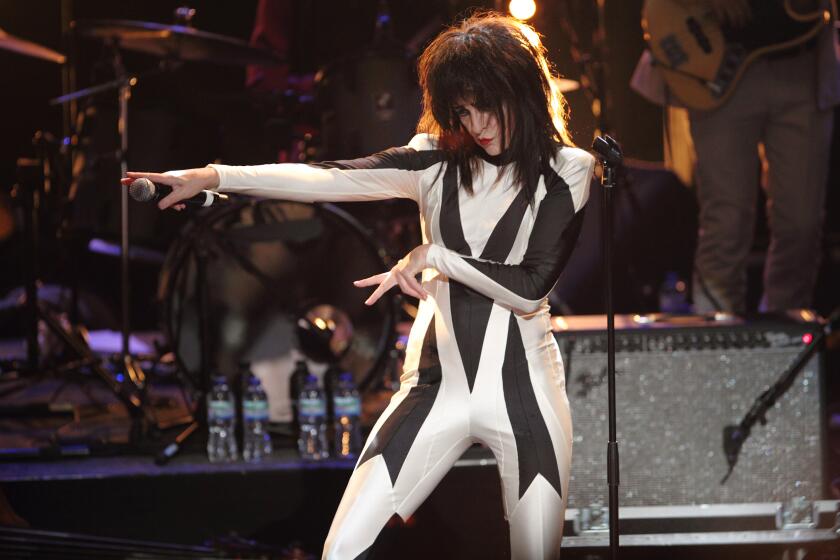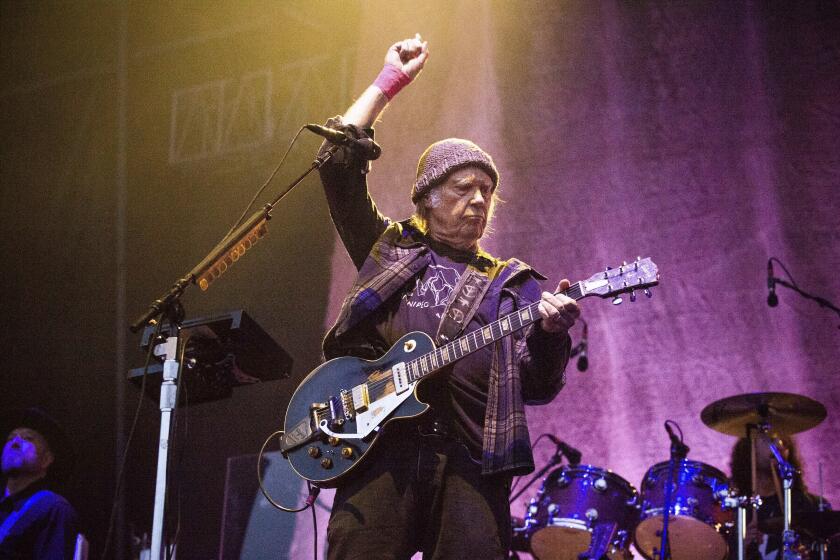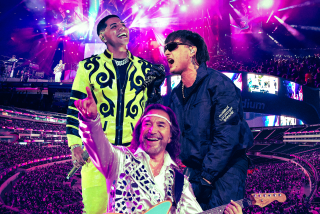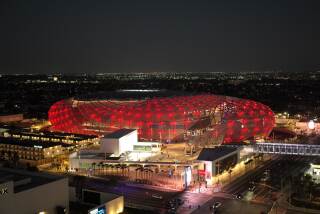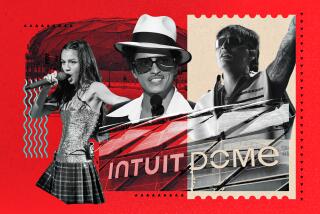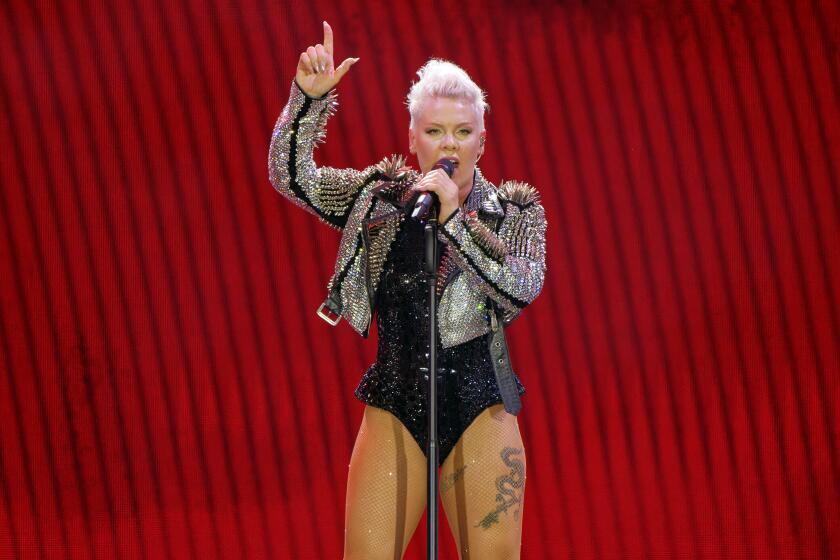L.A.’s Bellwether music club is set to make big splash by taking on the industry’s big dogs
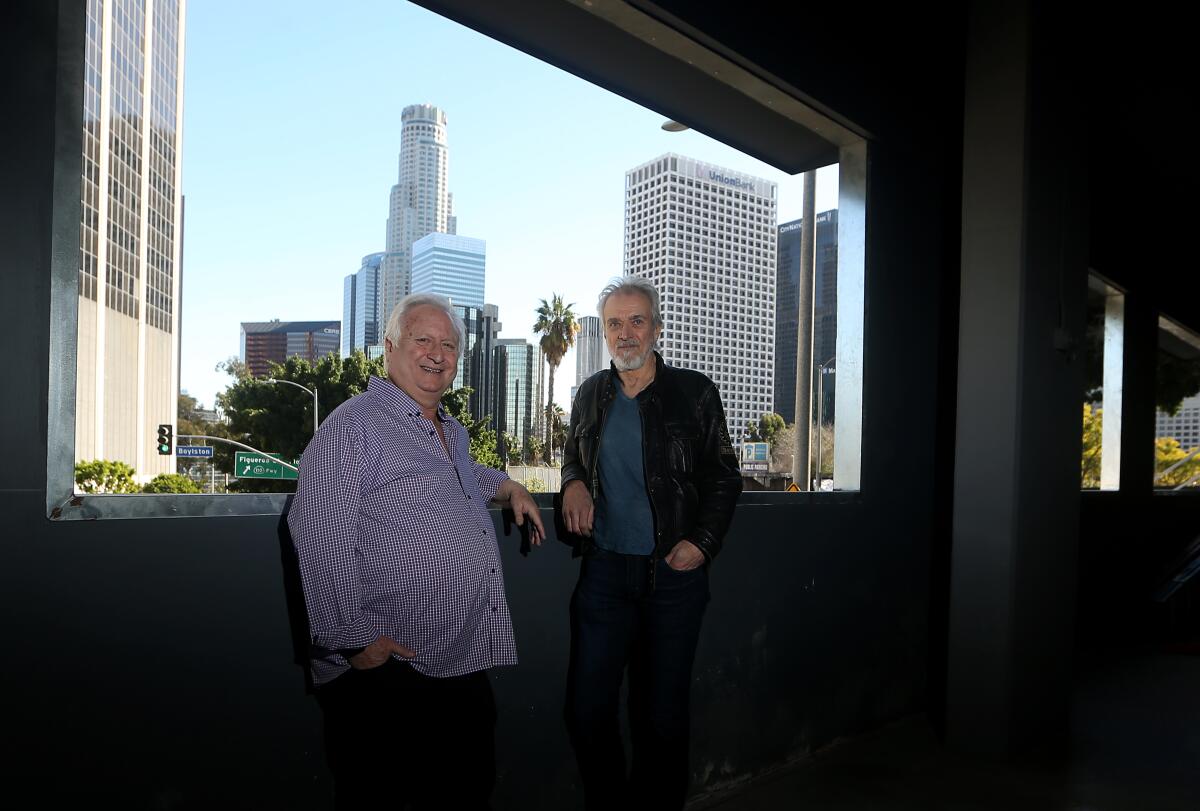
When the COVID-19 terror of March 2020 hit the L.A. music scene, every concert venue across town shut their doors. Some fell prey to the pandemic; for others, it took millions in federal stimulus funds and years of struggle to eventually recover.
A few weeks before the virus overwhelmed the U.S., Michael Swier, the owner of the Teragram Ballroom and Moroccan Lounge on the edges of downtown L.A., had signed a long-term lease for a 45,000-square-foot concert hall just west of the 110 Freeway. In a matter of days, a room meant to be the showpiece of Swier’s independent-venue archipelago was in mortal danger.
“That time was scary as hell,” Swier said, almost three years later as he walked through the fresh sawdust and poured concrete of his nearly completed downtown-adjacent venue, the Bellwether. “We didn’t know how long the pandemic was going to last, we didn’t know about any grants to keep our businesses going. But we still had that leap of faith that we were going to be OK.”
When the Bellwether opens to the public sometime this spring (the date’s not settled yet), it will indeed be a sign of the live music industry’s rebound after years of malaise. Central L.A. will have a glistening new 1,600-capacity nightclub with panoramic views of downtown’s skyscrapers and a talent-buying deal with the Bay Area’s tastemaking independent concert promoter, Another Planet Entertainment’s Gregg Perloff, who runs San Francisco’s Outside Lands festival.
All together, the Bellwether’s is L.A.’s highest-profile riposte to the Live Nation/AEG duopoly since the former bought local promoter Spaceland Presents in 2019.
“There’s nothing else that fulfills this need in L.A.,” Swier, 68, said. “For me, it harkens back to my time in New York when we’d help bands grow from the Mercury Lounge to the Bowery Ballroom and then Webster Hall. Every nook and cranny of this space is so important to us.”
The new wave and goth-rock fest, set to take place at Brookside at the Rose Bowl, will also feature Echo and the Bunnymen, Human League and Billy Idol.
From outside, 333 S. Boylston St. doesn’t look like much yet. The squat, dark gray facade is just a few blocks north of the Teragram Ballroom at the border of Westlake and Historic Filipinotown.
The building does have a storied L.A. nightlife history — in the ’80s, it housed the industrial-meets-high-fashion club Vertigo. Prince renovated it in the ’90s as his purple-pleasure palace Glam Slam, complete with a Victorian bed and his hieroglyphic logo embedded in the dance floor. In the 2000s it became Tatou, under former Studio 54 owner Mark Fleischman. More recently, the roving queer disco fête A Club Called Rhonda sporadically hosted such DJs as LCD Soundsystem’s James Murphy in there.
After Swier and Perloff’s down-to-the-studs renovations (they declined to give a budget, but said it was “in the millions,” and they have no outside investors), the interior is unrecognizable from any prior incarnations. They knocked down the concrete pillars to install a spacious parquet-patterned dance floor and a sweeping mezzanine (Swier’s brother Brian handled the venue design and finishes inside). A gigantic horseshoe bar will greet concertgoers in the foyer, but the best view might be from the outdoor lounge, with a 270-degree panorama of downtown’s skyscrapers that looks straight out of a Michael Mann action sequence. There will be guarded rooftop bicycle parking, an all-day restaurant and an in-real-life box office where fans can avoid digital queue stress.
“We’re not reporting to a huge corporation, so we can decide if we want all the fixtures to be at a much higher level,” Perloff said. “You’re gonna walk up the stairs and it’s like a Frank Lloyd Wright thing in there. I love the fact that we can do whatever we want to do and no one’s looking over our shoulder.”
While Perloff, 70, didn’t name any particular “huge corporation,” the Bellwether arrives as fans, artists and Congress are wondering whether global conglomerate Live Nation’s steady march of acquisitions have distorted the live music industry’s economics and creativity.
Fans, politicians and even artists were complaining about Ticketmaster long before Taylor Swift filled stadiums. But experts say the anger may be misplaced.
For independent venues operating on slim margins, COVID-19 was nearly the death knell for the kinds of rooms inclined to take booking risks and pay close attention to local culture.
“The pandemic terrified me that the independent music community would be eviscerated by multinationals with endless money. I know where new voices come from, and it’s not those corporations,” said Frank Riley, founder of the Bay Area booking agency High Road Touring, which handles acts including Robert Plant, Phoebe Bridgers and Interpol.
To him, the Bellwether will immediately be one of the first places he’ll look to send rising and established acts, as well as major stars seeking the intimacy of a smaller venue.
“For me, it’s a barometer of the health of the music business that people are investing in new buildings,” Riley said. “You have bigger rooms in L.A. like the Palladium and smaller places like the Troubadour and seated theaters like the Ace and Orpheum. But the middle level is kind of bereft. The ideal way to grow an artist is to allow an audience to grow around them.”
Rooms like the Fonda (1,200 capacity) and Wiltern (1,800) are its closest competitors, but Riley believes the Bellwether is “a missing link in L.A.”
“Younger audiences and high-energy acts want the excitement of a room like this,” said Riley.
A new collaboration between Swier (who splits his time between New York and L.A.) and Perloff (a chatty festival-biz veteran whose firm books Outside Lands and Las Vegas’ Life Is Beautiful, Berkeley’s Greek Theatre, San Francisco’s Bill Graham Civic Auditorium and Oakland’s Fox Theater) heralds a notable new alliance in West Coast live music.
While the two haven’t combined firms beyond the Bellwether’s talent-buying deal (though Another Planet’s talent-management arm will move into the Bellwether’s offices), there’s now a formidable new shop for booking independent shows of nearly all sizes in California’s major markets. Swier was deeply involved with the National Independent Venue Assn. during the worst of the pandemic, and the Bellwether’s incoming general manager, Casey Lowdermilk, leads California’s chapter of NIVA.
“We know that there are headwinds, we know that there are a lot of big boys in the market,” Perloff said. “Certainly, there’s been a great deal of consolidation in our business. But I hope there’s space for independent companies that aren’t beholden to anyone.”
Neil Young will perform in April at an autism charity concert, his first live show since the start of the COVID-19 pandemic.
Those headwinds are real. The pandemic has not disappeared; inflation and staff shortages have driven up costs for equipment, transportation and artist fees. In 2022, average club-level concert ticket prices rose to $35.84, versus $31.89 in 2019, squeezing already-stretched fans. In the concert trade publication Pollstar, Rev. Moose, a co-founder of NIVA, said that “from the practical day-to-day of running an actual venue, it’s never been more difficult ... financial stresses continue to wreak havoc on the independent sector, making it more and more difficult for folks that were already dealing with relatively small profit margins.”
Swier and Perloff hope to counter that with a largely Gen Z and millennial booking staff casting a wide musical net, from electronic to rock and hip-hop and folk, and they plan to make strong bids for residencies and multi-night stays from top acts. Perloff fondly recalled the Grateful Dead’s Jerry Garcia turning up to play stands at his San Francisco venues with just a few days notice.
“There are so many talented musicians in L.A. who are off cycle, and they might be sitting around and saying ‘Hey, let’s get together with our buddies.’ We’re open to people exploring here,” Perloff said.
They don’t have a wish list for opening night yet, but they know that once the Bellwether opens its doors, there’s more at stake than just the fate of a single live music room. It’s a test case for independent music’s ability to scale up and push back on the multinational tides dominating touring today.
“This is L.A., the whole industry is here,” Swier said. “I want them to see right away what this place can do.”
More to Read
The biggest entertainment stories
Get our big stories about Hollywood, film, television, music, arts, culture and more right in your inbox as soon as they publish.
You may occasionally receive promotional content from the Los Angeles Times.
